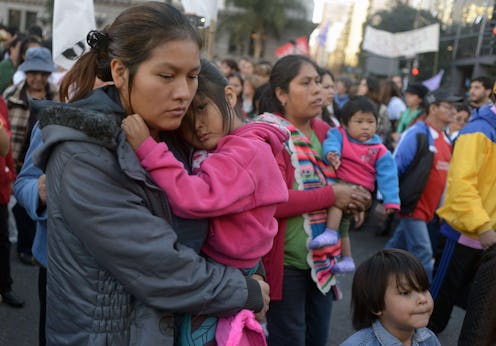News
Argentinian Women Are Protesting For Their Lives
Argentina is seeing a citizen uprising of massive proportions, as Argentinian women are becoming increasingly vocal about the murders of their fellow countrywomen. Thousands of protesters have taken to the streets of Argentina's capital, Buenos Aires, and elsewhere across the country in June. The protesters have a very straightforward demand: Stop murdering women. The rate at which women are murdered in Argentina is devastatingly high, necessitating immediate change. These protests are surely history in the making for Argentina and for women's rights on a global scale. As we watch this movement grow and unfold, there are some vital pieces of information to know about femicide in Argentina.
While this surge of large-scale demonstrations is recent, the problem of murdered women in Argentina is not. Even though a new domestic violence law was created for women living in Buenos Aires in 2012, women continue to become victims of domestic violence and murder at alarming rates. In 2014, the United Nations released a report revealing that Argentina comes in third for most murders per capita in Latin America (5.5 murders for every 100,000 people). Violence is a serious problem, and it is even worse for women. As we watch these women bravely fight for their lives, here is what you need to know about the problem of femicide in Argentina.
What Is Femicide?
Femicide refers specifically to the violent killing of women and is sometimes called gender violence. Femicide can also be lumped in with the broader category of domestic violence.
What Are The Statistics For Femicide In Argentina?
Because the term "femicide" is not recognized by all governments, it can be difficult to gather statistical information about femicide. Established and respected NGOs working in the country have become the source for information about gender violence in Argentina; a collective of these NGOs has determined that one woman is killed every 30 hours specifically because of her gender. That amounts to between five and six women per week. It is likely this number is lower than the actual count of femicides, as these groups were only able to use media reports of deaths to create their statistics.
When Did Argentina Start Recognizing Femicide As A Distinct Crime?
In 2012, Argentina passed a law that required a life sentence for committing femicide. Despite the law, the number of women murdered because of her gender has not decreased since 2012.
What Was The Catalyst For The Ongoing Protests?
The problem of violence against women in Argentina is by no means a new one, and women have been protesting against various human rights violations for decades. So what initiated the protests we're seeing now? On May 11, a postmortem examination determined the cause of death for a pregnant 14-year-old Argentinian girl Chiara Paez, was due to deadly beatings to her head, face, and other places on her body. The report also found traces of an abortion medication in her system. Paez's boyfriend confessed to the crime and is being charged with aggravated murder, femicide, and forced abortion. This is a high-profile case, and the findings sparked outraged and prompted thousands to take to the streets in protest.
Some are also attributing the protests to a tweet sent by Marcela Ojeda, a radio reporter in Buenos Aires. The end of her tweet reads "They are killing us." She wrote the tweet after reading one too many reports about murdered women in her country, and she felt compelled to speak out.
Why Is Femicide So Common In Argentina?
Femicides are perpetrated throughout the world, so why do they seem to be occurring at such terribly high rates in Argentina? The movement has pinpointed the culture of machismo that dominates much of Latin America. Everyday sexism has increased in hostility and aggression over time, a lesson for the whole world that sexism is never innocent. The culture of machismo and social dominance of men is so prevalent that in 2014, the mayor of Buenos Aires, Mauricio Macri, stated in a radio interview that "all women love a 'piropo' [compliment]. I don't believe those who say they don't." Street harassment is seen as a male entitlement, and women's rights activists agree this entitlement is now a life-threatening problem for women, because their rights are not recognized on a cultural level.
What Protections Do Argentinian Women Have?
Women in Argentina do have some legislative protections, though the challenge has always been effective implementation resulting in fewer incidences of femicide and other violence against women. That is to say, so far the legislation has been far from adequate at addressing gender violence. In 2009, a law was introduced that legally clarified the fact that domestic violence occurs both in and outside of the home. This law was significant in the sense that it acknowledged that women were the victims of violent crimes on a much broader level and could be hurt by people other than their husbands.
The previously referenced 2012 law that mandated a life sentence for a femicide conviction showed the government was somewhat beginning to take the safety of women more seriously by not allowing offenders to return to society. Also of significance in 2012 was the implementation of the DAMA program, which was launched on International Women's Day. The program provided small electronic devices that call for police help at the press of a button to 50 women who had filed domestic violence complaints against their husbands.
Where Can We Watch The Protests Unfold?
Like many social movements these days, a lot of the action is being captured on social media. The Twitter hashtag #NiUnaMenos (which translates to "Not One Less") is being used to discuss the protests and the movement.
Images: Getty Images (6)
